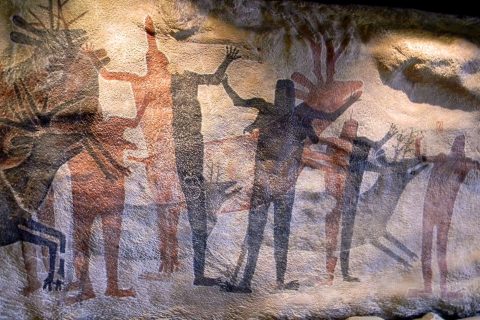Classics (BA)
Virtual information sessions
Discover what makes Concordia's Faculty of Arts and Science stand out as a leader in the humanities and social and natural sciences, including academic opportunities, hands-on learning and how to achieve your goals.
Why study Classics?
If you are intrigued by the ancient world, the Classics program is a great choice since it encompasses the study of all aspects of ancient Greece and Rome. Our innovative Classics programs provide an integrated and interdisciplinary environment that combines archaeology, ancient Greek and Latin, history, mythology and literature. These programs present the experience of classical civilizations as part of a continuum of human experience that includes 21st-century cultures. Classics offers a challenging program in which you can explore a critical and exciting period of world history.
Program highlights
- Gain both historical research and linguistic training in ancient Greek and Latin
- Small class sizes
Special funding for out-of-province students
Up to $4000 for undergraduate programs.
Program structure
A Bachelor of Arts takes a minimum of three to four years (90 – 120 credits) of full-time study, depending on your academic background.
Program options
- Honours in Classics – Ancient History and Archaeology (60 credits) *
- Major in Classics – Ancient History and Archaeology (42 credits)
- Minor in Classical Archeology (24 credits)
- Minor in Classical Civilization (24 credits)
- Honours in Classics – Classical Languages and Literature (60 credits)*
- Major in Classics – Classical Languages and Literature (42 credits)
- Minor in Classical Languages and Literature (24 credits)
*Honours is a highly concentrated program, ideal for students planning to continue to graduate studies. If you are interested in Honours, speak with your program advisor in your first year of study at Concordia. Students applying to the University are able to apply to the major.
Courses
United States students: A U.S. Federal Student Aid-eligible version of this program is offered. This version meets all U.S. regulations (such as no co-operative education or e-courses) for eligible programs.
Admission criteria
Minimum cut-off averages and course requirements
- Quebec CEGEP: 20
- High School: C+
- ACT or SAT is NOT required
- Canadian curricula course requirements
- Accepted international qualifications
- International Baccalaureate (IB) diploma: 26
- International Baccalaureate Career-related Programme (CP): 26
- Baccalauréat français: 11
- British system of education (GCE):
- A-levels: At least two A-level exams CD or
- AS-levels: At least 4 AS-level exams with equivalent results or
- BTEC: Level 3 Diploma or Extended Diploma in a related subject area with equivalent results
- Additional information for British System of Education (GCE) applicants
- University Transfers (internal/external): C
Minimum cut-off averages should be used as indicators. The cut-off data may change depending on the applicant pool. Applicants who meet the stated minimum requirements are not guaranteed admission to these programs.
Application deadlines
It’s not too late to apply
Most undergraduate programs are still accepting applications for fall 2025.

FALL ENTRY (September)
Deadline: March 1
International applicants: Apply no later than February 1 to allow time for immigration document processing. However, applying earlier is strongly recommended. Immigration processing times vary by country, and delays could prevent you from starting your studies on time.

WINTER ENTRY (January)
Deadline: November 1
International applicants: Apply no later than August 1 to allow time for immigration document processing. However, applying earlier is strongly recommended. Immigration processing times vary by country, and delays could prevent you from starting your studies on time.
We reserve the right to close admission to a program at any time after the official deadline without prior notice.
After your degree
Students who complete a Classics degree are ready to pursue graduate studies in Classics, Archaeology or a related field. Graduates will be well prepared for careers in any profession that requires in-depth ideas, fast information gathering, critical problem solving, dynamic oral and written communication, detailed analysis of data, and an experience of different cultures. Career opportunities can include:
- Law
- Graduate school
- Business
- Museums, archives and libraries
- Diplomatic positions
- Journalism and publishing
- Professional writing
Student story

Dustin Barker
Honours in Classics (Languages and Literature)
Combining the study of ancient languages with philosophical inquiry inspired Dustin to continue his research at the graduate level.
Other programs of interest

As an anthropologist, you study what it means to become a person in Canada and around the world. By systematically observing and investigating cultural life in diverse human societies, you’ll understand that much of what we assume to be natural is, in fact, constructed by our culture.
Department
Department of Sociology & Anthropology
Faculty

In our flexible program within the Faculty of Fine Arts, you focus on artistic periods that interest you. You perform academic research, learning to write formally and extensively about art.
Department
Faculty

Investigate the mysteries of the past. Historians are detectives, picking up a loose thread in the social fabric and unraveling it to weave a new narrative through time
Department
Faculty

Political science teaches you how the world works. As one of Concordia’s most popular degree choices, you will meet the world up close: in class, in action and in person.
Department
Department of Political Science
Faculty


